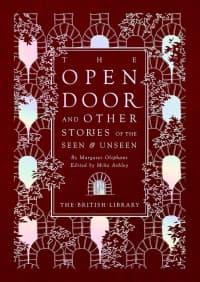
The Open Door and Other Stories of the Seen & Unseen by Margaret Oliphant
(British Library, 2021)
Reviewed by Andy Sawyer
One of the most interesting writers of the late 19th century was “Mrs Oliphant” (1828-1897), a novelist, short-story writer and critic of immense if variable productivity who, after her husband’s death in 1879 supported an extended family through her literary efforts. While a number of her novels were best-sellers, she is probably best-known today for her supernatural fiction.
In The Open Door Mike Ashley presents six stories with an introduction which asks, though doesn’t really answer, why so many British women of that time wrote ghost stories. For Oliphant, the reasons Ashley gives seem sound, linking fashionable spiritualism and a personal set of family traumas and losses. Most of the stories here offer glimpses into what Oliphant was to call the “Unseen”, the surrounding Afterlife which, according to some Spiritualist beliefs, can communicate with us. There’s a sense of loss, melancholy, and moral questioning which speaks well to the modern reader.
That’s not to say that the “modern reader” may not have to work. Oliphant’s prolixity and sentimentality may at times obscure her humour and sometimes chilling analysis. The presentation of the moral failings of the narrator’s father in “The Portrait” is perhaps an example. The sub-plot revealing that a good man can be cruel to those over whom he has economic and social power may sound trite. However, when we hear the full story of how the portrait of the narrator’s mother is obtained, and why the narrator is “possessed”, we see more than a proto-Scrooge. The ending might trouble the modern reader in a different way. Perhaps the most “obvious” stories are “The Secret Chamber”, inspired by the legend of something monstrous in a secret room in Glamis Castle, and “Dies Irae”. In the first, the abrupt ending begs continuation. The “Afterlife” setting of the second is laden with religiose Victorian spiritualism, though even here, sharp moral vision is at work. The narrator, on her deathbed, is faced with a guide, “The Blessed Damozel”, and the realisation that her journey onwards to the “Great Beyond” is dependent on her moral reaction to the lives of others. (In fact, if we replace the religious allegory with the motion of “privilege”, this could for good or ill be the collection’s most “modern” story.)
The eerie “Earthbound” is on one level the tale of someone falling in love with a ghost; but the conversations between the protagonist and the young woman in the white dress (with the same name as the woman he is to marry) suggest that the ghost has much more agency than normal in such an encounter. Furthermore, if we seek any explanation, we need to look beyond the usual idea of what a ghost is. “The Open Door” equally offers a kind of explanation (in fact, two) but there is a discrepancy between accounts of what’s seen on this haunted threshold which undermines the certainties of both the devout minister and the sceptical doctor.
“The Library Window”, the uncanny final story, is rich in meaning. From the recess in which the narrator secludes herself to read, she can see a window from the university library opposite — or is it a painted or bricked-up window? Illness, death, sexual pasts and, as critics of this prolific female author have noted, writing also play parts — the narrator’s father, she tells us, is a well-known writer, though she herself is “only” an obsessive reader; the figure she sees through the window opposite is constantly writing, and the reader is invited to construct the story through hints and remarks from a chorus of “old ladies” (and the old-maidish Mr Pitmilly). “Mrs Oliphant” sounds somehow stuffy, conventional, even priggish: (that she was allegedly Queen Victoria’s favourite novelist perhaps increases this sense). The “Margaret Oliphant” collected here is an intelligently wry and inventive owner of the ghost story.
Review from BSFA Review 16 - Download your copy here.
